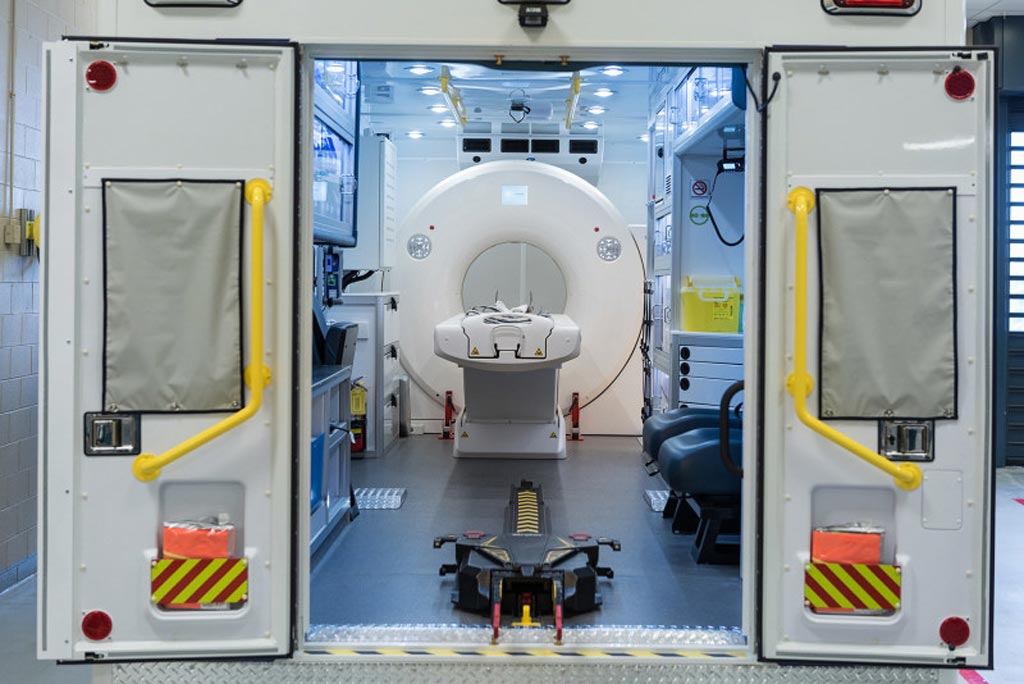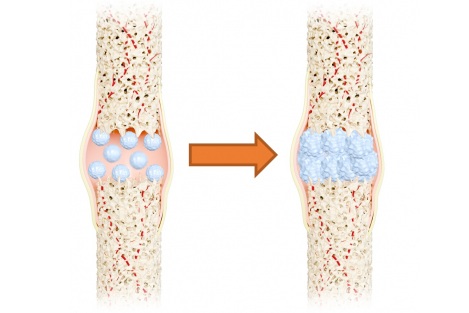Mobile Stroke Unit Delivers Care Thirty Minutes Sooner
|
By HospiMedica International staff writers Posted on 22 May 2018 |

Image: The specialized MSU is equipped with a 16-slice CT scanner (Photo courtesy of Northwestern Medicine).
A specialized ambulance equipped with a 16-slice computed tomography (CT) scanner can provide life-saving tissue plasminogen activator (tPA) 30 minutes faster than traditional ambulances.
The Northwestern Medicine (NM; Winfield, IL, USA) Mobile Stroke Unit (MSU) is a 14 ton ambulance fitted with a specialized CT scanner that takes detailed pictures of the brain, and a direct telemedicine connection to NM neurologists positioned in Central DuPage Hospital (Winfield, IL, USA). If the neurologist determines that the patient is experiencing an ischemic stroke, he can advise the MSU team to administer tPA while still en route to the hospital. The goal is to diagnose and treat stroke within the "Golden Hour", the first 60 minutes following onset of symptoms.
In addition to the neurologist, the dedicated MSU Stroke Care Team is comprised of a critical care nurse, a CT technician, an emergency medical technician (EMT) driver, and a critical care paramedic. The early intervention can lead to better outcomes, as stroke patients are typically not administered tPA until their arrival at the hospital. A recent data analysis of the MSU’s first year of operation found that on average, tPA was delivered to stroke patients 52 minutes after dispatch, compared to an average of 82 minutes for patients transported to hospital before receiving treatment.
“Treatment can be initiated within minutes of responding to a call. This is crucial because when it comes to stroke, time is a factor in treatment. By treating stroke patients faster, we are greatly improving the odds patients will suffer minimal to no long term deficits,” said Harish Shownkeen, MD, medical director of the Stroke and Neurointerventional Surgery Programs at NM Central DuPage Hospital. “For every minute you delay in getting treated for a stroke, you lose 1.9 million neurons; every minute the brain goes without oxygen, there is a 3.1 week acceleration of the natural aging process.”
Natural tPA is a serine protease found on endothelial cells. As an enzyme, it catalyzes the conversion of plasminogen to plasmin, the major enzyme responsible for clot breakdown. When manufactured using recombinant biotechnology techniques, it is referred to as recombinant tissue plasminogen activator (rtPA), which is used to treat embolic or thrombotic stroke. It is contraindicated in hemorrhagic stroke and head trauma.
Related Links:
Northwestern Medicine
The Northwestern Medicine (NM; Winfield, IL, USA) Mobile Stroke Unit (MSU) is a 14 ton ambulance fitted with a specialized CT scanner that takes detailed pictures of the brain, and a direct telemedicine connection to NM neurologists positioned in Central DuPage Hospital (Winfield, IL, USA). If the neurologist determines that the patient is experiencing an ischemic stroke, he can advise the MSU team to administer tPA while still en route to the hospital. The goal is to diagnose and treat stroke within the "Golden Hour", the first 60 minutes following onset of symptoms.
In addition to the neurologist, the dedicated MSU Stroke Care Team is comprised of a critical care nurse, a CT technician, an emergency medical technician (EMT) driver, and a critical care paramedic. The early intervention can lead to better outcomes, as stroke patients are typically not administered tPA until their arrival at the hospital. A recent data analysis of the MSU’s first year of operation found that on average, tPA was delivered to stroke patients 52 minutes after dispatch, compared to an average of 82 minutes for patients transported to hospital before receiving treatment.
“Treatment can be initiated within minutes of responding to a call. This is crucial because when it comes to stroke, time is a factor in treatment. By treating stroke patients faster, we are greatly improving the odds patients will suffer minimal to no long term deficits,” said Harish Shownkeen, MD, medical director of the Stroke and Neurointerventional Surgery Programs at NM Central DuPage Hospital. “For every minute you delay in getting treated for a stroke, you lose 1.9 million neurons; every minute the brain goes without oxygen, there is a 3.1 week acceleration of the natural aging process.”
Natural tPA is a serine protease found on endothelial cells. As an enzyme, it catalyzes the conversion of plasminogen to plasmin, the major enzyme responsible for clot breakdown. When manufactured using recombinant biotechnology techniques, it is referred to as recombinant tissue plasminogen activator (rtPA), which is used to treat embolic or thrombotic stroke. It is contraindicated in hemorrhagic stroke and head trauma.
Related Links:
Northwestern Medicine
Latest Critical Care News
- Origami Robots to Deliver Medicine Less Invasively and More Effectively
- Improved Cough-Detection Technology Aids Health Monitoring
- AI Identifies Children in ER Likely to Develop Sepsis Within 48 Hours
- New Radiofrequency Therapy Slows Glioblastoma Growth
- Battery-Free Wireless Multi-Sensing Platform Revolutionizes Pressure Injury Detection
- Multimodal AI to Revolutionize Cardiovascular Disease Diagnosis and Treatment
- AI System Reveals Hidden Diagnostic Patterns in Electronic Health Records
- Highly Sensitive On-Skin Sensing Monitor Detects Vitamin B6 and Glucose in Sweat
- Artificial Intelligence Revolutionizing Pediatric Anesthesia Management
- New Device Detects Tuberculosis DNA Directly in Exhaled Air
- New Menstrual Cup Could Detect Infections and Improve Diagnostics
- Engineered “Natural Killer” Cells Could Help Fight Cancer
- Faster Lymph Flow Predicts Better Response to Diuretics in Acute Heart Failure
- New Global Recommendations Aim to End Deaths from Postpartum Hemorrhage
- 'Flat-Line ECG' Indicates Poor Outcomes for Out-Of-Hospital Cardiac Arrest
- New Guidance to Improve Diagnosis and Management of Heart Failure During Pregnancy and Postpartum
Channels
Surgical Techniques
view channel
Novel Glue Prevents Complications After Breast Cancer Surgery
Seroma and prolonged lymphorrhea are among the most common complications following axillary lymphadenectomy in breast cancer patients. These postoperative issues can delay recovery and postpone the start... Read more
Breakthrough Brain Implant Enables Safer and More Precise Drug Delivery
Delivering medication directly to specific regions of the brain has long been a major challenge in treating neurological disorders. Current implants and infusion systems typically reach only one or two... Read morePatient Care
view channel
Revolutionary Automatic IV-Line Flushing Device to Enhance Infusion Care
More than 80% of in-hospital patients receive intravenous (IV) therapy. Every dose of IV medicine delivered in a small volume (<250 mL) infusion bag should be followed by subsequent flushing to ensure... Read more
VR Training Tool Combats Contamination of Portable Medical Equipment
Healthcare-associated infections (HAIs) impact one in every 31 patients, cause nearly 100,000 deaths each year, and cost USD 28.4 billion in direct medical expenses. Notably, up to 75% of these infections... Read more
Portable Biosensor Platform to Reduce Hospital-Acquired Infections
Approximately 4 million patients in the European Union acquire healthcare-associated infections (HAIs) or nosocomial infections each year, with around 37,000 deaths directly resulting from these infections,... Read moreFirst-Of-Its-Kind Portable Germicidal Light Technology Disinfects High-Touch Clinical Surfaces in Seconds
Reducing healthcare-acquired infections (HAIs) remains a pressing issue within global healthcare systems. In the United States alone, 1.7 million patients contract HAIs annually, leading to approximately... Read moreHealth IT
view channel
Printable Molecule-Selective Nanoparticles Enable Mass Production of Wearable Biosensors
The future of medicine is likely to focus on the personalization of healthcare—understanding exactly what an individual requires and delivering the appropriate combination of nutrients, metabolites, and... Read moreBusiness
view channel
Philips and Masimo Partner to Advance Patient Monitoring Measurement Technologies
Royal Philips (Amsterdam, Netherlands) and Masimo (Irvine, California, USA) have renewed their multi-year strategic collaboration, combining Philips’ expertise in patient monitoring with Masimo’s noninvasive... Read more
B. Braun Acquires Digital Microsurgery Company True Digital Surgery
The high-end microsurgery market in neurosurgery, spine, and ENT is undergoing a significant transformation. Traditional analog microscopes are giving way to digital exoscopes, which provide improved visualization,... Read more
CMEF 2025 to Promote Holistic and High-Quality Development of Medical and Health Industry
The 92nd China International Medical Equipment Fair (CMEF 2025) Autumn Exhibition is scheduled to be held from September 26 to 29 at the China Import and Export Fair Complex (Canton Fair Complex) in Guangzhou.... Read more













